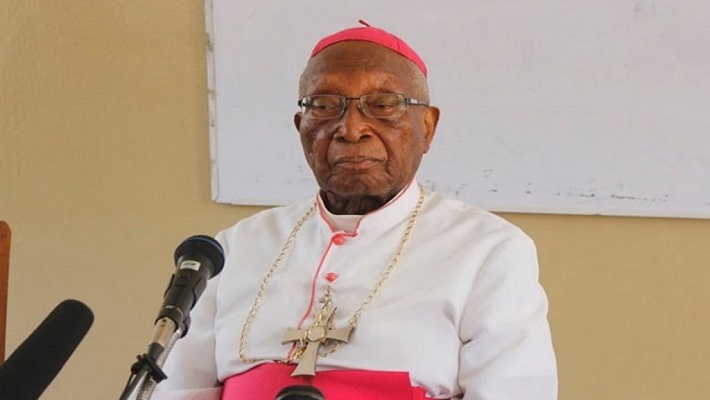By Arnold Neliba
LOME, JANUARY 12, 2024 (CISA)-Country awaits funeral arrangements for Archbishop Philippe Fanoko Kpodzro emeritus of the Catholic Archdiocese of Lomé who died while in exile in Sweden aged 93.
The archbishop, an ardent advocate against dictatorship, mismanagement, embezzlement of public funds, human rights violations, and who staunchly championed the cause of freedom and democracy died on Tuesday, January 9, 2024.
“In the morning of January 9, 2024, the news of the death of H.E. Mgr Philippe Fanoko Kpodzro, Archbishop Emeritus of Lomé reached the Conference of Bishops of Togo. While waiting to give information about his funeral, the Conference of Bishops of Togo invites us to pray that the Lord will welcome him into his kingdom,” said the President of the Episcopal Conference of Togo (CET), Bishop Benoît Alowonou in an announcement.
The former archbishop of Lomé, left Togo for Sweden after the February 2020 controversial presidential election which announced the incumbent president as the winner. He voiced against the election results and openly called on Togolese to reject the results prompting the government to put him under house arrest.
Born on March 30, 1930 in Tomégbé in the Catholic Diocese of Kpalimé, Archbishop Kpodzro began his studies in Togo. He studied at Petit Séminaire de Ouidah in Benin before leaving for Rome for his philosophy and theology. In 1955, he obtained a degree in philosophy then a degree in theology in 1959 in Rome. He was ordained a Priest of Lomé on December 20 1959 aged 29. He was later incardinated priest of Atakpame on September 29, 1964.
On December 19, 1975, he was appointed the Apostolic Administrator of Atakpame and four months later appointed bishop of Atakpame on April 10 1976 aged 46.
He was elevated as archbishop on December 17, 1992 aged 62a position he served until June 8 2007 when he retired as Archbishop of Lomé aged 77.
On his involvement in politics, the late archbishop of Lomé never shied from openly taking stands in the country’s political landscapes taking up appointments in times of crisis and endorsed political candidates. His significant contribution to Togo’s political scene was evident during the Sovereign National Conference from July to August 28 1991 an appointment offered to him after several other bishops refused. He thereafter led as the president of the provisional National Assembly from 1991 to 1994.
The Archbishop Emeritus of Lomé was an actor key to chairing this conference of the living forces of the Togolese Nation. A conference that would pave the way for the establishment of a multi-party system in the country.
“In 1991, Togo, in search of a democratic path, chose His Excellency Monseigneur Philippe Fanoko KPODZRO as President of the National Conference. While all was going to end well, the forces of evil joined together and the cross resurrected. The Bishop-President, in the middle of the assembly, was kidnapped for 24 hours and is suffering the humiliation we know,” recalled Doci N’danu shared by Radio Maria Togo.
It was under his leadership that the High Council of the Republic promulgated the constitution that limited the presidential term to two terms each of five years.
Togo plunged into a crisis in 2005 following the death of President Gnassingbé Eyadema. Togo’s army sealed its borders and put Faure Gnassingbe, the late president’s son, in power sprouting protests. The late archbishop alongside other clerics and members of civil societies organized peaceful demonstrations to put pressure towards the resolution of the country’s crisis.
Following mounting pressure including from the international community, Faure Gnassingbé stepped down on 25 February and was replaced by Bonfoh Abass, the first deputy parliament speaker, until after the presidential elections on 24 April 2005.
Archbishop continued with his political involvement after his retirement in 2007 as archbishop of Lomé when he supported Gabriel Agbéyomé Kodjo, the candidate of a coalition of several political parties. The loss of elections and subsequent calls for protests compelled him to seek asylum in Sweden.

